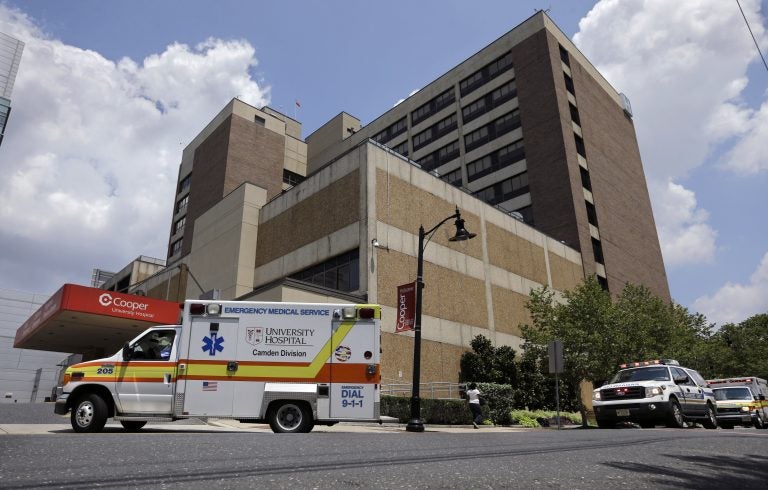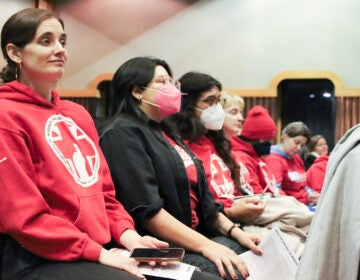Five South Jersey hospitals will pool info to better keep patients, docs in treatment loop
Under the new program, when a patient is admitted, a tailored care plan will pop up next to his name in the system — describing previous treatment and any preferences.

Cooper University Hospital in Camden, N.J. (Mel Evans/AP Photo)
Say someone shows up at the emergency room at Cooper Hospital in Camden because of an anxiety attack. And say that same person had been in the hospital the week before at nearby Jefferson.
Until recently, it’s likely that patient would be treated by ER doctors at the second hospital without any knowledge of his treatment history — meaning doctors will likely respond to the crisis, but not the overarching problem.
For people with mental health and substance-use issues, it can mean ending up in emergency rooms over and over again.
“Right now, it’s just episodic — they’re coming here, they’re going to Cooper, they’re going to Virtua,” said Russ Micoli, the head of ambulatory and behavioral health services at Jefferson Hospital in New Jersey. “We don’t really have a model at this point that allows us to be in the same loop.”
But a new initiative piloted by five, competing hospital systems in South Jersey (including the ones Micoli mentioned) aims to put an end to that cycle by sharing patient data and patient-care plans. With the new program, when a patient is admitted, a tailored care plan will pop up next to his name in the electronic system — describing not only previous treatments but any specific preferences.
Those preferences could range from simple de-escalation strategies to whether the patient prefers care from a male or female doctor. They could also include more substantive notes such as potential triggers, whether the patient is homeless, and medications to avoid.
The Camden Coalition of Healthcare Providers is working with the five-hospital collaborative to aggregate and track their shared data. The collaborative includes Cooper University Healthcare; Inspira Health Network; Jefferson Health New Jersey; Lourdes Health System; and Virtua Health System.
The health systems began sharing data in 2014 in response to reports of increased mental illness and substance abuse in the region. From the pooled data, the coalition found that between 2010 and 2016, the number of people admitted to hospitals for at least one primary behavioral health diagnosis increased by 40 percent. And people who used multiple hospital systems were more likely to have a behavioral health diagnosis. In fact, among those patients who had visited all five hospital systems, 80 percent had at least one behavioral health diagnosis.
By coordinating care plans, Micoli said he hopes to reduce the small group of people who most often use the ERs.
“The hospital emergency room has become the default location for folks experiencing mental health crisis,” he said. “These folks go out into the community, they struggle, and for one reason or another they end up back in the emergency room.”
Over the six years being tracked so far, the region saw a 25 percent increase in patients with at least one behavioral health diagnosis who visited an ER 15 times or more in one year.
Right now, each hospital is developing the detailed plans for the patients they see the most before they share them. The prototype for the plans was developed by Virtua Health System.
Emily Spector, senior program manager at the Camden Coalition, said some legal and technical challenges must be worked out in the implementation phase. Spector said they are working out the logistics of getting patient consent for their information to be filed and shared, after which it will be protected by “break the glass” functionality — which allows access to sensitive information in emergency situations. The collaborative is also working on standardizing metrics among the hospitals so that aggregate data can be consistent, as well as coordinating the electronic records to facilitate easier sharing. The five hospitals hope to be sharing patient care plans within a year.
WHYY is your source for fact-based, in-depth journalism and information. As a nonprofit organization, we rely on financial support from readers like you. Please give today.





